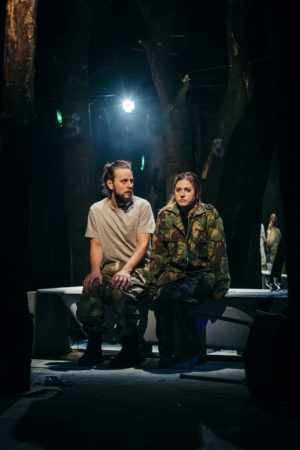You have no items in your cart. Want to get some nice things?
Go shopping
Writing a successful play about the devastation of war is difficult. A balance needs to be struck between, on the one hand, conveying the profound damage that organised violence wreaks on those caught up in it; and, on the other, the temptation to moralise. Surviving horror, as Primo Levi has shown in The Drowned and the Saved, requires one to operate in a moral grey zone. Natal’ya Vorozhbit strikes the balance perfectly in Bad Roads, a cleverly written and devastating portrayal of the war that is still raging in the Donbass region of Ukraine.
Put together from the recorded first-hand accounts of people caught up in the conflict, Bad Roads is made up of six scenes, carefully threaded together to give a sense of narrative, capturing mainly women’s experiences in the war. The play opens with a female journalist’s long monologue (in truth, too long) about her falling in love with a Ukrainian fighter against the backdrop of the front line:
On the other side of the bay the sound of explosions, and beautiful grey clouds of smoke rise like fountains and spread along the horizon. Over there is the village of Shirokino and the front line. Over there right now, men are blowing each other to bits with rocket launchers. The March sun is so bright.
You kiss me for the first time. You decide when and how to do it. I decide nothing. My legs go weak. I can’t stand. It feels like, this is fucking it, here it is, that very scene from the film about love, I have seen it and heard about it so many times, and felt it for others, but never for myself. Here you are, love. In your honour bombs are falling on the far shore. In your honour someone has just had their leg ripped off.
The poetic language captures the scene of destruction in a way that is more profound than a photograph or a faithful set, and great credit is due to the translator Sasha Dugdale in this regard. But it is this absurdity about falling in love – the belief that one’s beloved has been divinely blessed, the world being designed to accommodate them – that is deeply uncomfortable: how can we celebrate someone’s legs being ripped off?
War, as Vorozhbit explained in the rehearsal room, returns us to the most intense feelings of hate and love. Bad Roads not only demonstrates this, but also how the two are – somewhat inexplicably – inextricably linked. In what could be described as the play’s apogee, a young journalist is captured and sexually assaulted in the basement of a spa, a scene in which desire, love, hate and fear swirl in a giddying and disturbing mixture. Consider the following:
SHE. My mother –
HE. Just don’t say your mum died or I’ll come in your face. Your fucking misery is turning me on. So what do you say, you cunt? You keep talking, cunt.
SHE. I love you.
We are reminded in this scene of the Woman from the first describing her erotic obsession with the Ukrainian fighter: “You’ve got brown eyes, and when I look into them I feel as if they have taken me hostage and left me in a dark basement, where some unknown terror is about to begin.” The great irony is, as Vorozhbit shows us, that despite the hyper-masculinity and sexuality displayed by the men in this play, they are mostly impotent.
What is unique about Bad Roads is that it is written by a woman from the point of view of the sexual object. But the strength of the writing comes from the refusal to collapse into binary categories of victim and abuser, a careful line being chartered around victimhood and complicity – with humor in the final scene providing some needed relief. Vorozhbit also refuses to take sides – horror being perpetrated by both. Despite this moral grey zone, the message is clear: war spills over from the front lines into women’s lives. In a war marked by Russia’s use of propaganda and fake news, Bad Roads – a form of oral history – is a political act, documenting a shocking reality in a conflict characterized by fakery.
Vicky Featherstone’s production of Bad Roads is masterful. Acted in the round in the Royal Court’s studio space, the audience cannot hide behind distance. Featherstone handles the play’s darker sexual scenes with sensitivity, avoiding voyeurism by having the most shocking of these in the dark. The acting is outstanding, particular credit going to Ria Zmitrowicz whose quiet dignity is utterly convincing. The set, designed by Camilla Clarke, too, deserves credit: the pine trees sprinkled across the studio conveys the sense of place, without obscuring the audience’s view.
Beautifully and cleverly written, Bad Roads documents the sad and shocking reality of war: it ought to become a classic.
Bad Roads continues at the Royal Court Theatre until Dec 23. Tickets are available from £12.

About Emily Bueno
Emily Bueno has an M.Phil in literature from Trinity College, Dublin. She has written for the Telegraph Culture section and the TLS. She is a trainee solicitor and lives in London.




